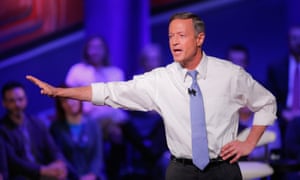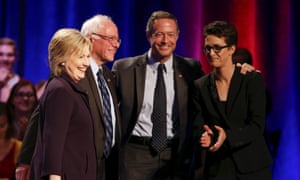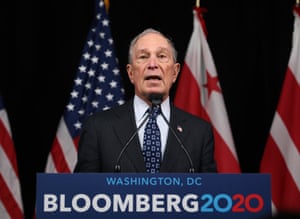‘How do you fall for the Bernie Sanders scam?’ Martin O’Malley on the Democrats and Iowa
In 2016, the Maryland governor ran for president. Now he’s taking the battle to Trump – and hoping his party won’t veer too far left

Photograph: Justin Sullivan/Pool/EPA
Four years ago, in Iowa, Martin O’Malley withdrew from the race for the Democratic presidential nomination.
To some, he’d seemed made for the job. Born in 1963, to working-class Democrats in the Washington suburbs, he was schooled in the Kennedy way. He volunteered for Gary Hart, the Colorado senator who was the party frontrunner for 1988 until scandal brought him down. Entering elected politics himself, O’Malley was the mayor of Baltimore from 1999 to 2007 and the governor of Maryland from 2008 to 2015. He aimed at the White House as a happy warrior, a guitar-playing politico with a record of progressive policy achievement.
But in the primary, he says, he found himself caught “between a rock”, meaning Hillary Clinton, “and an angry place”, meaning Bernie Sanders. There wasn’t room to breathe and his campaign went nowhere: the middle candidate in an election that ended up with America deeply divided.
A few days before Iowa votes again, O’Malley walks a few blocks from his Washington office. The room is quiet, the table discrete. The national stage is not. Over at the Capitol, in the impeachment trial, Donald Trump is on his way to acquittal. In Iowa and New Hampshire, Sanders is surging again. Some fear that in answer to Trump’s march to the right, Democrats are sliding too far left. O’Malley is among them.
“Bernie’s still being given a bit of a free pass by the national media,” he says. “I do not believe that he would be a strong candidate for our party in the fall. And, except for three months out of every four years, he’s not even of our party.”
Sanders sits in the Senate as an independent, a democratic socialist, the “d” very much lower-case. He may be 78 but he’s popular with the young. Since leaving office, O’Malley has taught at Johns Hopkins, Georgetown, Boston College and Carnegie Mellon.
“I would frequently tell my students, ‘Look, I know in my own generation we fell for the Nigerian prince scam, but how do you all fall for the Bernie Sanders scam?’ I don’t get that.
“Here’s a guy who has been a kind of stalwart of the National Rifle Association, a man who said immigrants steal our jobs right up until he ran for president, a guy who said the sound of John Kennedy’s voice made him nauseous.”
In conversation, O’Malley can seem to slip behind an invisible podium, rapping out his points with dramatic cadences, frowns and smiles. If there is an air of the stump speech, he’s given thousands. He did so again in 2017 and 2018, touring the country, supporting Democrats in midterm elections which swung hard the party’s way.
Of course, much of the energy which delivered such victories was determinedly progressive, akin to or directly supportive of Sanders and his transformative effect on the liberal cause. But O’Malley is as much a pillar of the party as Sanders is not.

“I respect the fact that he’s been saying the same things, mostly, since 1952, albeit dialing down his hatred for John Kennedy and his disdain for immigrants, but I just don’t get the appeal.
“He’s a man who never has accomplished anything in public office, who has I believe demonstrated his inability to forge a governing consensus, let alone hold a governing consensus. And I think he’d be an awful choice as our party’s nominee.”
He smiles. “Do you want me to speak more frankly?”
O’Malley has irons in many fires, teaching, consulting, campaigning. He’s written a book, Smarter Government: How to Govern for Results in the Information Age.
It’s a textbook, built on a use of data in government well known among policy geeks. But O’Malley’s lyrical side is never far from the surface and the book is shot through with stories from his time as mayor and governor.
Some such stories, he says, feature in another manuscript, written with the guidance of the late Richard Ben Cramer, the author of What It Takes, “the definitive book about the 1988 presidential race” in which Hart flew so high then fell. Its title is Baltimore: A Memoir and a piece of it is out there on the web. Some publishers want O’Malley to rewrite it, he says, to tie his own story more closely to the idea he was the model for the mayor of Charm City played by Aidan Gillan in The Wire, David Simon’s groundbreaking HBO series. He’s not keen.
“Everyone gets one Wire question,” he says, laughing a little ruefully. As the only person in America who hasn’t seen The Wire I don’t have one, so he describes instead an invitation over to Ireland to sit with Gillan at a celebration of the life and music of Shane McGowan. O’Malley still plays in his own eponymous band.
He says he wrote his textbook “because democracy’s in a crisis and the crisis is democracy itself. Whether governments of and by the people can still deliver the things that make a republic worth having, in essence lives with greater safety, security and opportunity for ourselves and our kids. That’s the question on the table.
“And set against the declining trust that Americans express in their national government is a quieter story that’s rising across the country, from cities that are well-governed. And that’s a story of rising trust, of smarter government, of taking advantage of the tools that no prior generation has had, to model, measure and map changing human dynamics in ways that allow us to make better and more timely decisions.
“Whether those better results are improving student achievement or reducing violent crime or turning around a 300-year decline in the health of the waters of the Chesapeake Bay, I consider myself to have been very fortunate and blessed to have served at a time when this new way of governing was just emerging.”
Such focus seems timely: with the federal government in Trump’s sclerotic grip, cities in particular have begun to take a lead. On climate change, for example, some US mayors have reacted to Trump’s withdrawal from the Paris deal by saying they will simply pursue its aims themselves.
That showed one way Trumpism might be challenged, away from the polls and the corridors of power. It is also challenged on the streets of the cities themselves.

On the night before Thanksgiving, O’Malley went as he does every year to the Dubliner, a Capitol Hill pub, with other graduates of Gonzaga, a Washington Jesuit high school. Then another member of an 80s class walked in: Ken Cuccinelli, formerly attorney general of Virginia, now the acting director of US Citizenship and Immigration Services for the hardline president.
The Gonzaga gathering, O’Malley says, is a friendly one, a chance for the old boys “to ask, ‘Hey, how are you doing? How’s your wife? How’s your kids? What are you up to?’
“And into the bar walked Donald Trump’s child-taker in chief.”
That is a reference to the Trump administration’s family separation policies at the southern border, of which O’Malley has been a vocal opponent. Cuccinelli was soon walking back out of the Dubliner, driven back on to Massachusetts Avenue by a blast of Baltimorean anger.
“We recognized each other from the Sunday shows and having served together. We shook hands … but it was not a moment for me to simply say, ‘Hey, how’s work?’ I know how work is with him.
“Work with him is really bad for a lot of human beings because he shoves those cages on the south-west border full with as many brown-skinned, Spanish-speaking, mostly Catholic people as he possibly can.
“I told him he was a coward and he put the little kids in cages. And when he tried to get a drink at the bar, other people started telling him the same thing. So after the patrons drove him from the place, someone at the bar decided to tweet it out and then it went kind of viral.”
The Washington Post picked up the story and for a while it fuelled debate around such public confrontations: do opponents of the Trump administration owe it a debt of civility?
“Each of us has to make our own decision in these unprecedented times,” O’Malley says, “about whether we want to be silent in the face of suffering being inflicted on other people at the hands of our government, or whether we stand up to it.
“And some of us will stand up to it by running as candidates, others will stand up to it as elected officials, others will stand up to it as lawyers, others will stand up to it in social settings. And for me at that moment in time, I couldn’t look myself in the mirror in the morning if I missed the opportunity to let him know that he wasn’t welcome. And so I did.
“The day we become passive in the face of that sort of immorality, injustice, that sort of systemic child abuse exercise by our own government, that’s the day we lose our republic.”
Cuccinelli, needless to say, saw the evening differently. But viral fame recedes quickly and O’Malley is back in milder climes, publishing op-eds in the Post, concerned with the push against Trump at the polls.
After 2016, he considered running for chair of the Democratic National Committee but stepped back when he sensed a “a proxy echo of the Sanders-Clinton clash and there wasn’t oxygen there”. Tom Perez, once the Maryland secretary of labor, ended up in the role but O’Malley supported a young mayor from the Republican heartlands: Pete Buttigieg, now a challenger in the presidential primary.
For Buttigieg, O’Malley says, “that race really wasn’t about DNC. That race was about putting on the sneakers and getting around the track”. The younger man, he says, has gone on to beat all expectations.
But in an echo of the frustrations of 2016, O’Malley criticises the way the DNC has run the primary, particularly the way debate qualifications based on polling data and donor numbers – changed this week – have kept the likes of the former Massachusetts governor Deval Patrick (“a friend” to whom O’Malley has donated) and the Montana governor Steve Bullock firmly out of the spotlight.

O’Malley isn’t ready to endorse again – he first backed Beto O’Rourke – but he expresses a wish to “hear more from” Michael Bloomberg, the billionaire former New York mayor whose self-funded campaign has kept him off the debate stage too. He thinks that wish is shared by others.
“I would think Bloomberg’s opening,” he says, “is if there’s a muddled finish [in Iowa and New Hampshire] or an unelectable leftist. That’s Bloomberg time. In 2016, there were some people who said to me, ‘Well, if you could only have hung in until we got totally sick of Bernie.’ And I said, ‘Well, I couldn’t. I had no money.’ I was out there rattling the tin cup, from county square to county square.”
Either way, he hopes the party will decide wisely.
“I do believe,” he says, “that in 2016, a year of anger, rage and retribution, a cry for new leadership got squeezed between a rock and the angry place. But I think people are looking for that leadership now.
“Each of the many candidates who stepped forward this year has caught the attention of the voters for a week or two as being great vehicles for people to demonstrate that they really dislike Donald Trump. That they were 180 degrees diametrically opposed to Donald Trump. And being opposed to Donald Trump, giving him the proverbial finger … is being opposed to a white, racist misogynist.
“All of that’s part of the process. But at the end of the day, we have to nominate someone who can defeat him and who can bring our country together and govern.”



